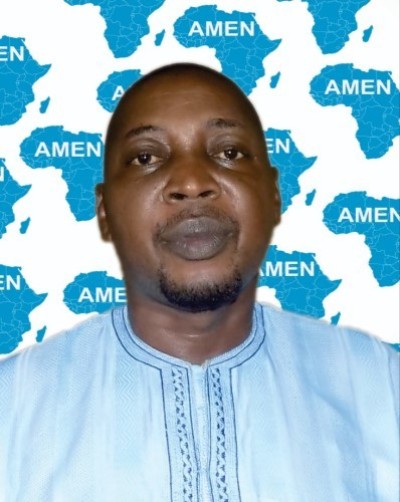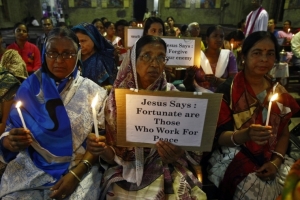Reaching the unreached with the Gospel only is not good enough

I had a call to preach Christ where no one has ever preached Him and was confused on how to go about it. One fateful day in March 2007, I heard a knock on the door of my office and behold, someone came in and introduced himself as a missionary working among the unreached people's group. He was seeking support. I helped him and asked that he take me to an unreached community where no one has preached and no one has heard about Jesus.
We scheduled a visit to an unreached village. On the day of our visitation, I drove for five hours and when we could not continue because of the dead-end of motorable road, we had to use a motorcycle for the remaining part of the journey, which lasted for another two and half hours. As we were approaching the village, I noticed a seizure of my breath. I was dehydrated because of the intense heat of the sun, and immediately I alighted from the bike and fell down and fainted.
I was resuscitated by the water that was poured on me and when I opened my eyes, I requested for water. They brought a bowl of dirty brown water with spirogyra and mucous swimming on top. I saw the swimmers but could not resist the urge to drink because I needed it for my survival. I drank and emptied the bowl and told the missionary to mobilize the villagers so that I can preach Christ to them.
To my greatest surprise, I saw women coming out from their huts with leaves and rags covering their pubic regions and their breasts were exposed. The children had protruding stomachs and were naked and malnourished, while the men were all dressed in dirty rags, famished and frustrated. I opened my Bible to the book of John chapter 3 verse 16, I wanted to tell them about the love of God but my tongue stuck to the roof of my mouth as the vacant hopeless look on their faces kept on tormenting me as I gazed at them.
I just noticed hot tears flowing down my cheek; there was no correlation between the love of God and the degraded status of my target persons. I ended up not introducing Christ to them. I did not know when I opened my mouth and promised them that I will come back to give them food, clothes, drugs, soap and detergent. I also promised them that I was coming to dig boreholes for them. We left in a psychological and emotional mess with the vacant hopeless looks of the villagers constantly tormenting me.
When we returned home I was rushed to the hospital and was admitted for two weeks. I had typhoid, diarrhea, and gastric intestinal infection because of the contaminated water that I drank in my mission field. When I recovered, I summoned all my team members for a strategy meeting. We developed seven forms of strategic interventions for the unreached: Gospel intervention, feed the hungry program, clothe the naked program, clean water program, orphan and vulnerable children program, medical mission, and education program.
After about two months, we gathered enough resources and launched back to this village with eighteen motorcycles loaded with food, clothes, soaps, slippers and detergents. Immediately when the villagers saw us ride into the village with our entire load, the vacant hopeless looks on their faces disappeared and broad smiles were resonating from their faces.
We preached Christ crucified and told them that Jesus was coming to prepare them for His kingdom. They said that they would love Jesus to come and be their king but their challenge was that they do not have a good house for Him to live, good food for Him to eat, and no clean water for Him to drink. It was then that we realized that they thought that Jesus was a human being. We then took our time to explain to them the divinity of Christ and that His abode is in their hearts. We made an altar call and they all surrendered to Jesus.
We developed the strategy of Gospel in one hand and humanitarian aid in the other and this has done tremendous and great wonders in our Gospel intervention to the unreached. We have used this strategy to access so many unreached communities where ordinarily we would not have gained access.
In thirteen communities where we have taken the Gospel to, not a single person had preached or heard about Jesus before our intervention; not a single person has gone to school as of the year 2020; and women roam the village naked with patches of rags covering their pubic region. These people never ate rice before we came and gave them the food and the communities have very high child and adult mortality rates. Their children roam the bushes like wild animals.
We have encountered children between twelve and six years old who have not worn clothes before our intervention. Many of the children had not taken baths for years and when we bathed them, layers of their skin fell off along with congealed dirt. In a particular mission field, we had a heartbreaking experience. We visited the people to check on them, only to discover that none of our adult female convert was in the village. We inquired about where they were and was told that they left the village two days ago in search of dirty drinking water because the only source of water in the village had dried up.
According to the villagers, "The aged are dying from thirst and cries of children resonate all over the village every night requesting for dirty water to drink and none is available". Preaching the Gospel to the unreached without addressing their humanitarian crises will amount to criminal negligence. The unreached do not just need the Gospel, they also need humanitarian intervention. The Western missionaries utilized the 3-Cs strategy (Christianity, Civilization and Commerce) to reach Africa for Jesus and this strategy should be used by anyone who desires to reach the unreached.
Oscar Amaechina is the president of Afri-Mission and Evangelism Network, Abuja, Nigeria. His calling is to take the gospel to where no one has neither preached nor heard about Jesus. He is the author of the book Mystery Of The Cross Revealed.




























